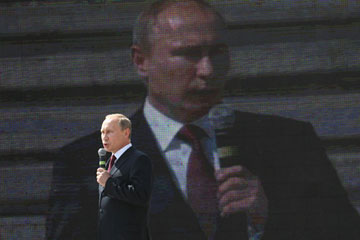
Russian President Vladimir Putin delivers a speech at the opening of the Barmaley Fountain on August 23, 2013 in Volgograd, Russia.
Since May, when Vladimir Putin began his third term as President, his declared objective has been to launch a 21st century Russian resurgence. But his rhetorical embrace of Russia's imperial past at home has brought him increasingly into conflict abroad--particularly with the West. Putin tried fitfully during the first decade of his rule to find common ground with the U.S. and its allies. Now he's blithely burning those bridges. The real-world effects of Putin's newly confrontational approach have been most evident in recent weeks with the crisis in Syria. Russian officials have suggested that a U.S. military strike against the Assad regime could lead to a war that would engulf the Middle East and even spread to Russia's southern frontier in the Caucasus.
The proximate cause of the latest spat was Russia's decision to grant asylum to Edward Snowden, the whistle-blower who is wanted in the U.S. for leaking the secrets of American intelligence agencies. But the roots of Putin's confrontationalism are as much political and economic as they are personal and historical.
Now, after a year of deadlock on everything from human rights to nuclear nonproliferation, the U.S. and Russia are as much at odds as at any time since the Cold War. The confrontation will be on full display Sept. 5-6 as Putin hosts world leaders at the G-20 summit in St. Petersburg for talks on the Syria crisis and the halting global economic recovery.

